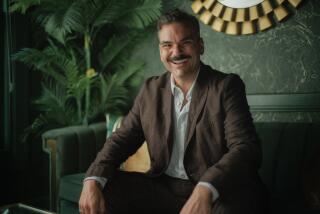‘The Urban Hermit’ by Sam MacDonald
In April 2000, Sam MacDonald was fat, broke and deep in debt. A hard-partying Yale alumnus, he had spent a decade in an orgy of over-consumption, drinking his paychecks and living a Peter Pan-meets-”Animal House” lifestyle.
And yet, this didn’t finally scare him straight; it was a bad transmission and a shocking tax bill. “I would have lived that way forever if I could have,” he writes in his first book, “The Urban Hermit.” “I just couldn’t. It cost too much. Ten years of eating and drinking and spending had finally come crashing down that April.”
His half-baked decision was to stop all consumption other than what was necessary to live. This wasn’t a diet so much as a financial plan that didn’t allow for any food other than lentils and low-grade canned tuna. His preliminary research consisted of one phone call to a nutritionist cousin who urged him not to eat fewer than 1,200 calories a day.
“I decided right then and there that it would be eight hundred calories. Sure, she was a professional nutritionist. But twelve hundred calories? . . . Twelve hundred calories was for supermodels on crash diets. Soccer moms who needed to lose five pounds fast.”
With nothing but belt notches to measure his progress and the mantra “Suck it up” to keep himself on track, MacDonald withdrew from drugs, alcohol, cigarettes and life as he knew it. Bored, starving and sick of himself, he turned to work as an escape.
He threw himself into a job at a small suburban newspaper, using deadlines as a distraction from hunger. Along the way, he discovered a passion for journalism, which opened up a whole new world, taking him to Bosnia and then on an odyssey to a hippie festival in the woods before he met the woman he would marry.
MacDonald’s new life was fraught with temptation. Even a piece of cake at an office party threw him into moral disarray. Although he never uses the word “addiction,” it’s clear that excess is his drug.
“How about a shot,” he asks, “and another, and a meat loaf platter. And whatever happened to that guy who used to set us up with the Ecstasy? . . . I know if I take one bite of that cake I’ll be on my second bottle of Wild Turkey by eleven o’clock tonight, swimming in it by morning.”
That’s good stuff: vivid, gritty. Still, as “The Urban Hermit” progresses, MacDonald never digs deeply enough into this aspect of himself. Why is he so driven to excess? Where do his demons come from? While he clearly struggles, he reveals little of his emotional journey, perhaps because that might come off as whining.
As a result, while “The Urban Hermit” is refreshingly non-self-indulgent, it feels like a piece is missing. One wonders if the book isn’t an elaborate exercise in denial.
By April 2001, MacDonald had punched new holes in his belt, pounding push-ups and running the streets of Baltimore with a loaded backpack. Things became downright “Rocky”-esque. You can almost hear Bill Conti’s horn section swelling in the background. The Apollo Creed he was training to KO was his own entropy.
Though MacDonald presents himself as a chucklehead, he’s really quite savvy, setting his personal struggle against the rise and fall of our overindulgent consumer culture. “The year 2000,” he writes, “was an age of excess. NASDAQ. Enron. Reality TV. People were fat and happy. But things were about to change.”
The book’s timing is uncanny, coming at a moment when Americans are feeling the effects of decades of unregulated bingeing. We all might do well to eat more lentils.
But MacDonald urges us to not try this stunt at home. “Anyone stupid enough to view ‘The Urban Hermit’ as a diet book and use it as such will probably die of kidney failure,” he notes. “Seriously, don’t try it. You’ll get hurt.”
He’s right. “The Urban Hermit” is self-help for the “Jackass” generation. Like a rocket-powered shopping cart launched off a short pier, it gets out of control. MacDonald alarms his loved ones by taking it too far. He finally stops because he’s too thin.
Still, it’s hard not look at the results and wonder if we couldn’t take a page from this book. “I was debt free,” MacDonald declares when all is finished. “I was a political journalist. I was camera-ready. A fellow with a job and a girl and a future. I had struggled. But I had emerged from the Beast of the American Belly. And I had emerged victorious.”
Not bad for lentils and tuna fish.
Schickel is the author of “You’re Not the Boss of Me: Adventures of a Modern Mom.”
More to Read
The biggest entertainment stories
Get our big stories about Hollywood, film, television, music, arts, culture and more right in your inbox as soon as they publish.
You may occasionally receive promotional content from the Los Angeles Times.










